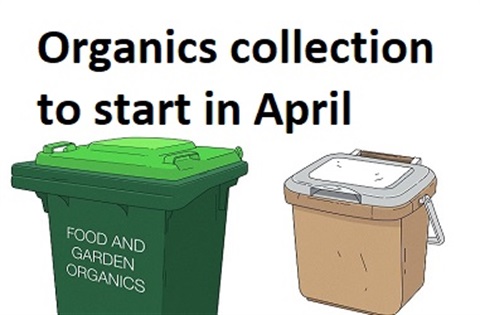Kerbside food and garden organics collection to start in April
Published on 31 January 2024

Kerbside bin collection is set to change in townships in Hepburn Shire with the introduction of a weekly food and garden organics service (also called FOGO) from Monday 8 April 2024.
With the introduction of weekly organics collection for townships, red-lidded landfill (general rubbish) bins will move to fortnightly collection, with no changes to the fortnightly yellow-lidded recycling collection.
Households in Creswick, Trentham, Daylesford, Hepburn and Hepburn Springs will receive a lime green-lidded bin and kitchen caddy in mid-to-late-March, with the weekly collection starting in townships after Easter. The weekly organics collection will continue in Clunes, where residents have successfully trialled the service since 2021.
Mayor of Hepburn Shire Cr Brian Hood said a separate food and garden organics collection will help to divert thousands of tonnes of organic material from landfill.
“Our bin audits show that more than half of the contents of the average red-lidded landfill bin are items that will be able to be placed into the new organics bin. This includes food scraps and leftovers, meat, bones, dairy products, garden clippings, leaves and weeds,” said Cr Hood.
“Instead of ending up in landfill these items will be treated as a valuable resource and converted to high-quality compost at in-vessel units at the Creswick Transfer Station. The compost will then be used to improve soil for local farms, parks and gardens,” he said.
Residents will also be able to drop off up to 120L of food organics for free at Council's three transfer stations from 8 April. Fees will be introduced from 1 July.
Cr Hood said there are many compelling environmental reasons for diverting organics from landfill.
“Composting organics emits about one-tenth of the amount of carbon dioxide equivalent compared to when it is sent to landfill. In addition, when food ends up in landfill it creates methane, a powerful greenhouse gas that is at least 28 times more potent than carbon dioxide,” said Cr Hood.
“When we developed our four-year Council Plan the community told us that sustainability and protecting the environment is the highest priority. We have since developed our Sustainable Hepburn strategy, in partnership with the community, which identified introducing a food and organics collection as a key action.”
Council will fund the roll-out cost and collection for 2023/2024 through its Waste Reserve Fund. Ratepayers won't see any change to the waste charge until the 2024/2025 financial year.
“We will have greater clarity on the actual cost of the service to households when we develop our 2024/2025 budget. However, processing organics locally and reducing the amount of waste sent to landfill will help to minimise the cost to ratepayers,” said Cr Hood.
Council recognises that some households may be concerned that a fortnightly general rubbish bin won’t be sufficient for their needs. Households will have the option to purchase additional collection services. However, they may be able to significantly reduce the amount of waste that goes to landfill by carefully separating waste items. Council officers will host pop-ups at communities to share information about the new service and answer questions.
“Our bin audits show around 12 percent of the contents of red-lidded bins could instead be placed in yellow-lidded recycling bins. With around 50 percent of the red-lidded bin able to be diverted into the organics bin we expect many households could reduce the volume of waste going to landfill by around 60 percent,” said Cr Hood.
Council will review extending the service to rural areas next financial year. The initial roll-out does not include businesses (other than those participating in the Clunes trial). However, businesses will be able to opt into an organics collection from July 2024. Township households will not be able to opt-out of the organics collection.
There has been an increase in the cost of sending waste to landfill in recent years. An organics service will significantly reduce the amount of waste that Hepburn Shire sends to landfill, which will also reduce landfill fees and overall transport costs and emissions.
Many local governments have already introduced a food and garden organics service, including Macedon Ranges Shire, City of Greater Bendigo, Melton City Council, Central Goldfields, Campaspe and Southern Grampians and more. Fifty-three out of 79 councils in Victoria already offer organics collection services.
Under the state government’s Recycling Victoria legislation, all local governments must implement an organics service by 2030. Residents wanting to find out more about the upcoming changes can visit Council’s website for more details at www.hepburn.vic.gov.au/organics.
Change in collection – current township v post organics collection implementation
|
|
Current
|
Post-organics implementation (from April 2024)
|
|
Collection
|
Collections per year
|
Collection
|
Collectionsper year
|
|
Red-lidded landfill collection
|
Weekly
|
52
|
Fortnightly
|
26
|
|
Yellow-lidded recycling collection
|
Fortnightly
|
26
|
Fortnightly
|
26
|
|
Lime-green lidded organics collection
|
N/A*
|
0
|
Weekly
|
52
|
|
Total collections
|
|
78
|
|
104
|
*Excluding Clunes organics trial